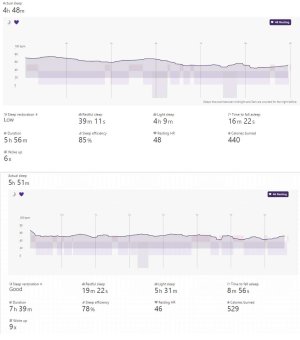Shripad Lale
New member
I believe that in order to understand sleep restoration, you need to see 'the other' view of your charts - the one with heart rate. The sleep pattern chart shows the resting heart rate, but how long it was at this resting heart rate, decides the sleep restoration. That can only be seen on the heart rate chart.

I am attaching my charts, which clearly shows two similar sleep patterns, but you will see that the one with the apparently worse sleep patters gives better sleep restoration. You will see the reason once you switch to the Heart Rate chart, and see that in the 'Good' sleep restoration case, the heart rate was closer to the resting heart rate for a longer time. Restoration is all about how LONG your body had, to restore its resources, and if the heart rate went low enough, so that restoration could begin.
Now, to answer some question about what one can do about it, anything that calms your mind would work. It could be a workout, run, cycling, or meditation. I have tried meditation, and it works like magic. The top chart is before I went to a 10 day meditation camp, the bottom one is after I returned. The variability in the heart rate (HRV, as davidthetall wrote above) was much lower on my return, indicating that my mind was far less agitated. I have been tracking my sleep ever since, and have repeatedly seen that when I start meditating even an hour a day, my sleep quality improves drastically. But whatever works for you is good.
Finally, I think the sleep tracking of band really works, and it can give you some good insights that will not be available otherwise.

I am attaching my charts, which clearly shows two similar sleep patterns, but you will see that the one with the apparently worse sleep patters gives better sleep restoration. You will see the reason once you switch to the Heart Rate chart, and see that in the 'Good' sleep restoration case, the heart rate was closer to the resting heart rate for a longer time. Restoration is all about how LONG your body had, to restore its resources, and if the heart rate went low enough, so that restoration could begin.
Now, to answer some question about what one can do about it, anything that calms your mind would work. It could be a workout, run, cycling, or meditation. I have tried meditation, and it works like magic. The top chart is before I went to a 10 day meditation camp, the bottom one is after I returned. The variability in the heart rate (HRV, as davidthetall wrote above) was much lower on my return, indicating that my mind was far less agitated. I have been tracking my sleep ever since, and have repeatedly seen that when I start meditating even an hour a day, my sleep quality improves drastically. But whatever works for you is good.
Finally, I think the sleep tracking of band really works, and it can give you some good insights that will not be available otherwise.
Last edited:


